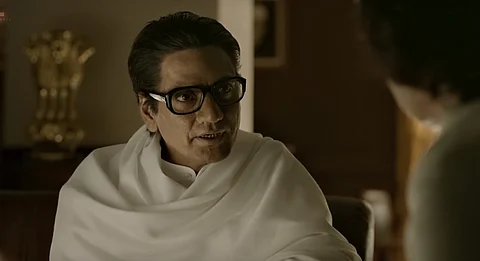
- Reviews
- Power List 2024
- Cannes 2024
- In-Depth Stories
- Web Stories
- News
- FC Lists
- Interviews
- Features
- FC SpecialsFC Specials

Director: Abhijit Panse
Cast: Nawazuddin Siddiqui, Amrita Rao
Loathed and loved in equal measure, Bal Thackeray is a difficult man to judge. Even six years after his death, history doesn't seem to have arrived at a conclusion that is definitive. The courtroom is thus an interesting place for Thackeray, his biopic, to begin. One hopes there'll eventually be a verdict now.
Played by Nawazuddin Siddiqui, we see Thackeray take the stand in Lucknow. The judge almost stands when the firebrand politician enters court. Intimidated and incompetent, the CBI lawyer fumbles repeatedly. Director Abhijit Panse has his protagonist where he likes him best—on a pedestal and in control. Accused of having orchestrated the 1992 demolition of the Babri Masjid in Ayodhya, Thackeray is unruffled by the gravity of the charge. His disposition is all passion, his rhetoric all vitriol.
Siddiqui, as an actor, should, of course, have the right to exercise his freedom when choosing his roles. He does, for instance, get the physicality of Thackeray down pat, but that cannot excuse a performance that is wholly monotonous.
Allowing his protagonist to further defend his infamous brand of right-wing politics, Panse periodically returns to the Lucknow courtroom over the course of the next two hours. But this is the limit of his invention. The rest of the film is staid and chronological. Sanjay Raut's story and Panse's screenplay feel like a long Wikipedia entry. There are many subheads, but no core thread that ties them together.
Thackeray, we know, began his professional career as a cartoonist. This biographical detail gives license for some shoddy animation at the start, but worse, it also allows the film's makers to caricature more than half of the film's cast. Thackeray's newspaper editor, his political rivals (Morarji Desai, in particular), and even his supporters are one-dimensional. Nearly all of them become easy to lampoon.
As we see Thackeray grow in stature, we see how he ruthlessly crushes dissent, how he endorses the use of force and violence, and how he uses regionalism and nationalism to strengthen his divisive influence. It feels strange then that for a radical leader such as Thackeray, he doesn't seem to have more than one emotion—quiet seriousness. Siddiqui's talents, as a result of this, are wasted entirely.
Siddiqui, as an actor, should, of course, have the right to exercise his freedom when choosing his roles. He does, for instance, get the physicality of Thackeray down pat, but that cannot excuse a performance that is wholly monotonous. Thackeray, if Siddiqui's portrayal is to be believed, never felt anger or fear. Despite being a cartoonist, he never cracked a joke that was funny. Importantly, despite being a fiery orator, he was seemingly incapable of imbuing everyday dialogue with any fresh novelty.
There is also a demure earnestness with which Amrita Rao plays Meena Tai (Thackeray's wife), but the trouble here again is that her steadfastness never wavers. It's not just that the film's leads lack the ability for change; they also don't seem to have the capacity for the most basic of fluctuations that makes us human. Also, while we see glimpses of what Thackeray was like as a husband and a son, the biopic completely ignores his role as a father. The omission only makes his legacy much harder to map.
Thackeray, as a film, is hard to trust. At one point, we hear its Bal Thackeray say, "I believe in a man's deeds, not his religion." Strangely, the film itself sees the leader making inflammatory pro-Hindutva speeches in the lead-up to the riots of 1992-93. In 2009, for instance, Sachin Tendulkar had said, "Mumbai belongs to India. That is how I look at it. I am a Maharashtrian and I am extremely proud of that. But, I am an Indian first." Thackeray had laid into him in a Saamna (Shiv Sena mouthpiece) editorial: "You have become 'run-out' on the Marathi pitch." This biopic now suggests that for Thackeray, the nation had always come before state.
Directors of propaganda films usually rely on drama when trying to rewrite history. You need emotions to belie facts. Abhijit Panse, sadly, doesn't even succeed in bringing a full set of feelings to the table. In the end, Thackeray is for most part an orientation film for Shiv Sainiks, whose notions of history have to be shaped for the future. One can maybe expect audiences in the party's strongholds to cheer a couple of times, but even they would acknowledge that Thackeray is no blockbuster. The film ends with the words 'to be continued' flashing on screen. It would suffice to say—we really have seen it all.